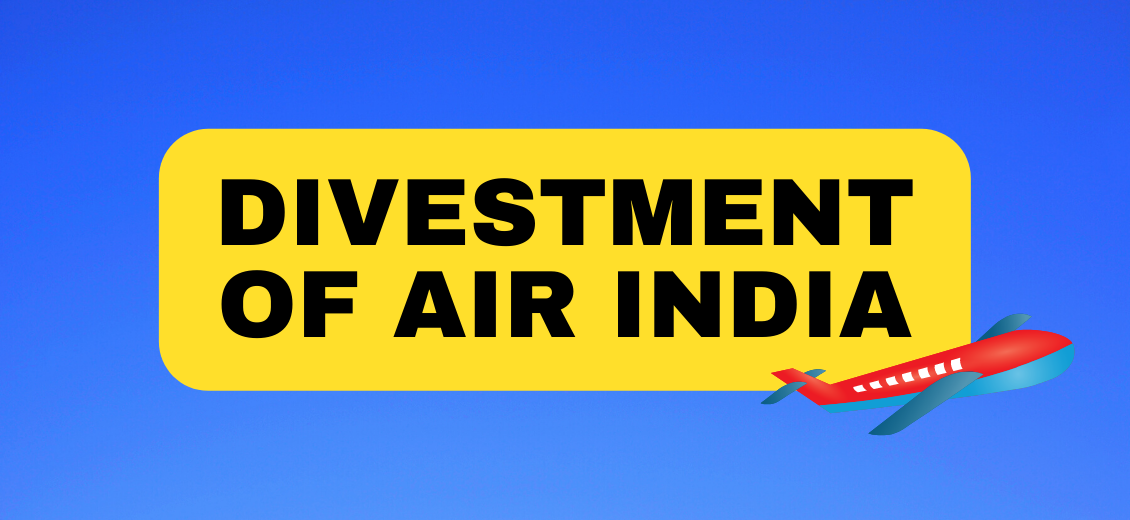Divestment of Air India
Blogs Home
- 19 Oct 2021

Divestment of state assets is a common practice to raise funds by the government of India. During the 20-year long history of divestment, the government of India has divested several enterprises like Indian Petrochemical Corp Ltd (IPCL), Hindustan Zinc Ltd, Maruti Udyog to name a few.
The divestment of Air India had been pending for far too long. It cost a fortune to Indian taxpayers. As of 31st August 2021, the national flag carrier had accrued more than Rs 60,000 Crore of debt. The government of India had been looking for a buyer for Air India since 2001. After 20 years, it landed back on the lap of the Tata group that had originally started the airline as Tata Airlines.
With the divestment of Air India, the journey that started on 15th October 1932 with the first flight of Tata Airlines flown by Bharat Ratna JRD Tata who was the first licensed pilot of our country, has come to a new juncture. It was a euphoric moment for the Tata group and the people observing the divestment process of Air India when the news of Talace Pvt Ltd, a subsidiary of Tata Sons, winning the bid, broke.
Tata Airlines started as a flying mail service that upgraded itself to passenger flights. It became a public limited company under the name Air India in 1946. It started operating internationally by 1948 and eventually got nationalized under the Air Corporations Act 1953. JRD Tata was not in favour of nationalizing Air India. As an industrialist, he knew inexperience in running an airline would only hinder the growth of the enterprise.
Although it turned into a public sector enterprise, JRD Tata’s association with the airline was intact as the chairman of Air India. The airline garnered an international reputation for its efficiency under his watch. But eventually, a dream conceived, birthed and nurtured by a person passionate about flying turned into a nightmare for the government of India for several reasons.
Prime Minister Pt. Nehru’s economic policies sought to develop Indian industries rapidly. There were 17 industries open only for the public sector under the Industrial Policy of 1956. Aircraft and air transport industries were also among them. In a closed economy, Air India maintained itself pretty well. It could not keep pace with the changing landscape of aviation as the Indian market opened for private and foreign players.
India underwent economic reforms in the form of liberalization, privatization and globalization in the 1990s. The entrance of private players into the Indian aviation sector posed fierce competition to the flag carrier airline and resulted in a gradual decline in its competitiveness. Furthermore, the involvement of foreign entities made the situation worse for Air India. As the Indian aviation sector was soaring high with more low-cost carriers coming into the market, the national carrier was continuously going down.
Air India, which was once a leading airline of the world, started making losses from 2007 onwards. Incessant attempts to recover losses by the government of India could not bear any fruit. Secretary of the Department of Investment and Public Asset Management (DIPAM), Tuhin Kanta Pandey stated that since 2009-10 the GOI has given 1,10,276 Crore to Air India as fiscal support. The acquisition of Air India by the Tata group is a relief to the government and the Indian taxpayers, considering the insuperable losses.
The Tata group rescued the government of India earlier also when it acquired Videsh Sanchar Nigam Limited (VSNL) in 2002 by buying 25% of its stakes with an amount of 1439 Crore. Today, it is a leading digital ecosystem enabler, with Tata Communications Ltd, making a profit and helping the Indian economy move ahead. This time around, it has more reasons to convert Air India into a profit-making business. It is not just a market venture but also has a significant sentimental value to the Tata group.
The incumbent government has once again shown the necessary political will to bring imperative economic reforms. The Prime Minister has repeatedly reiterated that the government has no business to be in business. With the divestment of Air India, the Prime Minister has walked the talk.
Air India was on life support for years. The government did everything in its capacity to breathe life into it by extending necessary financial support. Now it has successfully found a qualified and experienced doctor to treat the ailment. Has the doctor made it on time or is it too late for the national carrier to take off! Only time will tell.

Priyanka Todariya




